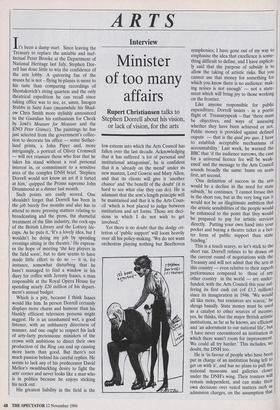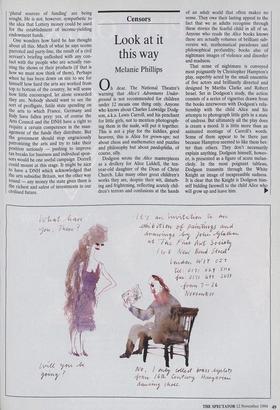ARTS
Interview
Minister of too many affairs
Rupert Christiansen talks to Stephen Dorrell about his vision, or lack of vision, for the arts It's been a damp start. Since leaving the Treasury to replace the amiable and inef- fectual Peter Brooke at the Department of National Heritage last July, Stephen Dor- rell has done little to win the confidence of the arts lobby. A quivering fan of the muses he is not – flying bi-planes is more to his taste than comparing recordings of Shostakovich's string quartets and the only theatrical expedition he can recall since taking office was to see, er, umm, Imogen Stubbs in Saint Joan (meanwhile his Shad- ow Chris Smith more stylishly announced to the Guardian his enthusiasm for Cheek by Jowl's Measure for Measure and the ENO Peter Grimes). The paintings he has just selected from the government's collec- tion to decorate his office — some Suther- land prints, a John Piper and, more intriguingly, a portrait of Oliver Cromwell — will not reassure those who fear that he takes his stand without a real personal interest in, or commitment to a sensitive area of the complex DNH brief. 'Stephen Dorrell would not know an art if it farted at him,' quipped the Proms supremo John Drummond at a dinner last month.
Such points are easily scored. One shouldn't forget that Dorrell has been in the job barely five months and also has to attend to more pressing matters relating to broadcasting and the press, the shameful treatment of the film industry, the cock-ups of the British Library and the Lottery hic- cups. As he puts it, 'It's a lovely idea, but I wouldn't be doing my job by spending evenings sitting in the theatre.' He express- es the hope of meeting 'the key players in the field soon', but to date seems to have made little effort to do so — it is, for instance, somewhat disturbing that he hasn't managed to find a window in his diary for coffee with Jeremy Isaacs, a man responsible at the Royal Opera House for spending nearly £20 million of his depart- ment's annual budget.
Which is a pity, because I think Isaacs would like him. In person Dorrell certainly displays more charm and humour than his blankly efficient television persona might suggest. He is an unashamed wet, a good listener, with an unblustery directness of manner, and one ought to respect his lack of arty-farty pretensions: ministers of the crown with ambitions to direct their own production of the Ring can end up causing more harm than good. But there's not much passion behind his careful replies. He seems to lack any of his predecessor David Mellor's swashbuckling desire to fight the arts' corner and never looks like a man who is in politics because he enjoys sticking his neck out.
His greatest liability in the field is the low esteem into which the Arts Council has fallen over the last decade. Acknowledging that it has suffered 'a lot of personal and institutional antagonism', he is confident that it is 'already on the mend' under its new masters, Lord Gowrie and Mary Allen, and that its clients will give it 'another chance' and 'the benefit of the doubt' (it is hard to see what else they can do). He is adamant that the arm's length principle will be maintained and that it is the Arts Coun- cil 'which is best placed to judge between institutions and art forms. Those are deci- sions in which I do not wish to get involved.'
Yet there is no doubt that the dodgy cri- terion of 'public support' will loom heavily over all his policy-making. 'We do not want orchestras playing nothing but Beethoven symphonies; I have gone out of my way to emphasise the idea that excellence is some- thing difficult to define, and I have explicit- ly said that the purpose of subsidy is to allow the taking of artistic risks. But you cannot use that money for something for which you know there is no audience: mak- ing noises is not enough' — not a state- ment which will bring joy to those working on the frontier.
Like anyone responsible for public expenditure, Dorrell insists - in a poetic flight of Treasuryspeak – that 'there must be objectives, and ways of assessing whether they have been achieved or not. Public money is provided against defined ouputs — that is the quid pro quo. I have to establish acceptable mechanisms of accountability.' Last week, he warned the BBC that 'if the audience narrows, the case for a universal licence fee will be weak- ened' and the message to the Arts Council sounds broadly the same: bums on seats first, art second.
'One definition of success in the arts would be a decline in the need for state subsidy,' he continues. 'I cannot forsee this in the short run, but in the very long run it would not be an illegitimate ambition that the artistic sensibilities of the people would be enhanced to the point that they would be prepared to pay for artistic services directly. Putting your own hand into your pocket and buying a theatre ticket is a bet- ter form of public support than state funding.'
This is a touch scarey, so let's stick to the short run. Dorreil refuses to be drawn on the current round of negotiations with the Treasury and will not admit that the arts in this country — even relative to their superb performance compared to those of any other country in the world — are under- funded, with the Arts Council this year suf- fering its first cash cut (of £3.2 million) since its inauguration in 1946. 'We would all like more, but resources are scarce,' he shrugs banally. State money must be used as a catalyst to other sources of income; yes, he thinks, that the major British artistic institutions, as far as he knows, are efficient and 'an adornment to our national life', but 'I have never encountered an institution in which there wasn't room for improvement• We could all try harder.' This includes, no doubt, the DNH too. He is 'in favour of people who have been put in charge of an institution being left to get on with it', and has no plans to pull the national museums and galleries closer under the DNH's wing. Their trustees will remain independent, and can make their own decisions over vexed matters such as admission charges, on the assumption that `plural sources of funding' are being sought. He is not, however, sympathetic to the idea that Lottery money could be used for the establishment of income-yielding endowment funds.
One wonders how hard he has thought about all this. Much of what he says seems parroted and party-line, the result of a civil servant's briefing unfleshed with any con- tact with the people who are actually run- ning the shows or their products (if that is how we must now think of them). Perhaps when he has been down on site to see for himself how hard the arts are worked from top to bottom of the, country, he will sense how little encouraged, let alone rewarded they are. Nobody should want to see the sort of profligate, futile state spending on the arts to which France, Germany and Italy have fallen prey yes, of course the Arts Council and the DNH have a right to require a certain competence in the man- agement of the funds they distribute. But the govenment should stop ungraciously patronizing the arts and try to take their position seriously — pushing to improve tax breaks for business and individual spon- sors would be one useful campaign Dorrell Could mount at this stage. It might be nice to have a DNH which acknowledged that the arts subsidise Britain, not the other way round — any money the state gives them is the richest and safest of investments in our civilised future.



































































 Previous page
Previous page